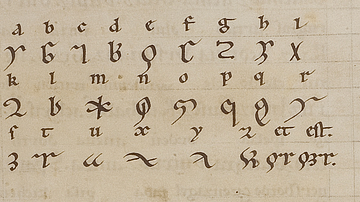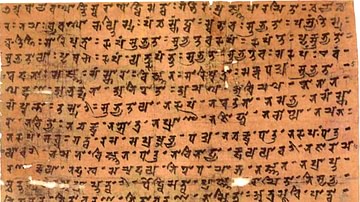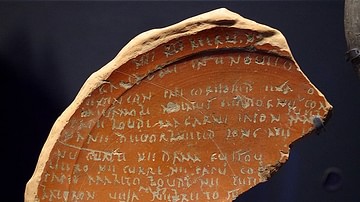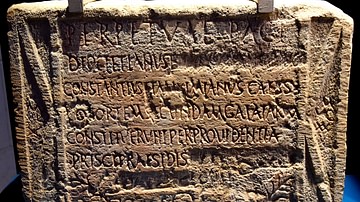Search
Remove Ads
Advertisement
Summary 
Loading AI-generated summary based on World History Encyclopedia articles ...
Search Results

Definition
Romani Language
Romani is an Indo-European language, belonging to the Indic subbranch which includes Sanskrit and Hindi. Because of the Romani diaspora throughout Europe and West Asia, it developed in close contact with European and Iranian languages. It...

Definition
Sumerian Language
The Sumerian language was spoken in southern Mesopotamia before the 2nd millennium BCE and was the first language to be written in the cuneiform script. It is an isolate language meaning we know of no other languages that relate to it ancestrally...

Definition
Indo-European Languages
The Indo-European languages are a family of related languages that today are widely spoken in the Americas, Europe, and also Western and Southern Asia. Just as languages such as Spanish, French, Portuguese and Italian are all descended from...

Definition
Etruscan Language
The language of the Etruscans, like the people themselves, has remained somewhat mysterious and has yet to be fully understood. The alphabet used a western Greek script, but the language has presented difficulties to scholars because it is...

Article
Hildegard of Bingen's Unknown Language and Unknown Letters
Sometime in 1153 or 1154, the German nun Hildegard of Bingen (1098-1179) wrote a letter to the elderly Pope Anastasius IV (1073-1154). Her words were scathing. She called the pope tired and criticized his rule, describing him as too accepting...

Article
The Phoenician Alphabet & Language
Phoenician is a Canaanite language closely related to Hebrew. Very little is known about the Canaanite language, except what can be gathered from the El-Amarna letters written by Canaanite kings to Pharaohs Amenhopis III (1402 - 1364 BCE...

Video
Origins of Written Language (Language of Coins: 2/16)
The origin of pictographic & ideographic writing systems are imagined in the first part of this story (proto-writing). The rebus principle is introduced, setting the stage for the development of an alphabet. Featuring some key artifacts from...

Definition
Sanskrit
Sanskrit is regarded as the ancient language in Hinduism, where it was used as a means of communication and dialogue by the Hindu Celestial Gods, and then by the Indo-Aryans. Sanskrit is also widely used in Jainism, Buddhism, and Sikhism...

Article
A Linguistical Analysis of Ancient Celtic Languages
The Celtic languages form a branch of the Indo-European (IE) language family. They derive from Proto-Celtic and are divided into Continental Celtic languages (Lepontic, Gaulish, Galatian, Noric, Celtiberian, Gallaecian) and Insular Celtic...

Image
Latin Inscription from Jordan
Latin inscription about an ancient Roman fort and settlement in modern-day Aqaba, southern Jordan, Roman Period, 293-303 CE, discovered in 2013. It weighs about 225 kilograms and was mounted on the fort's main gate, as a tribute to the...